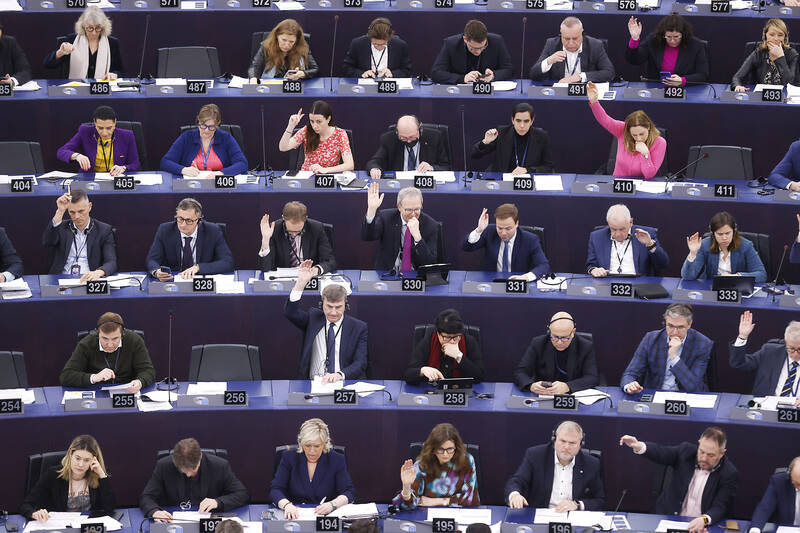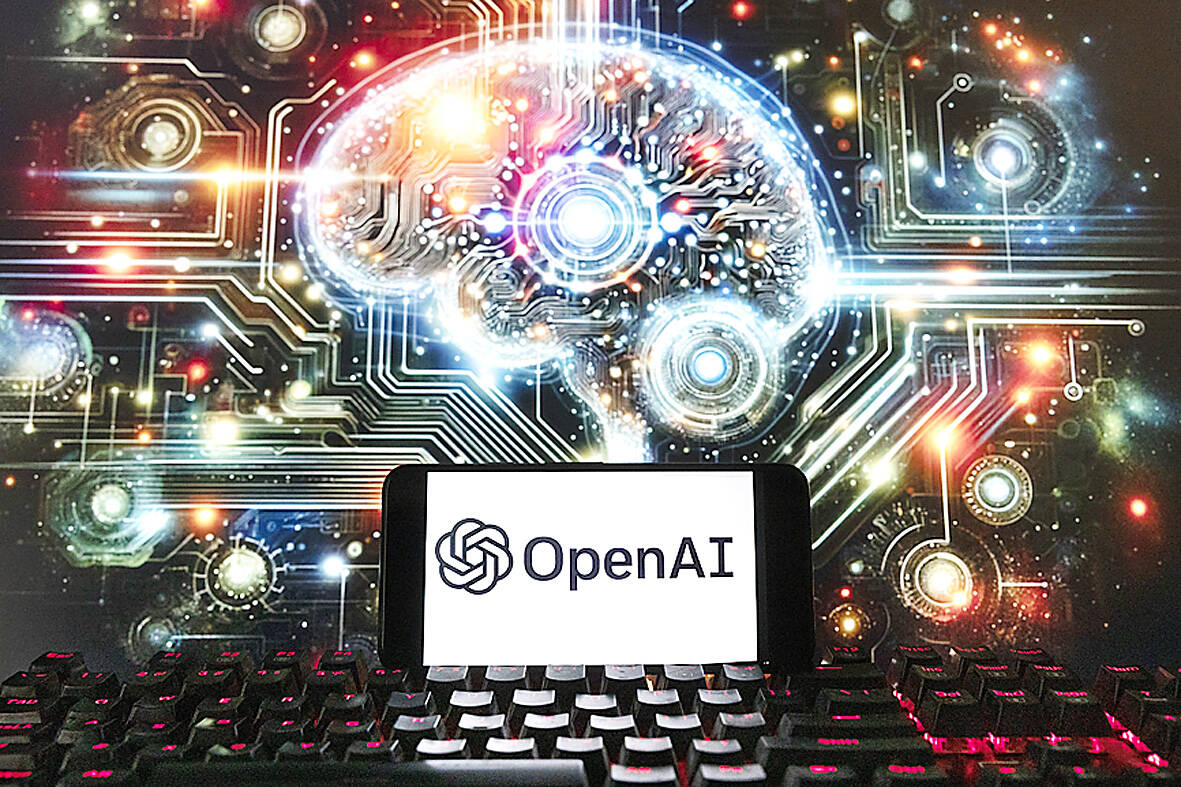European Union lawmakers gave final approval to the 27-nation bloc’s artificial intelligence law Wednesday last week, putting the world-leading rules on track to take effect later this year.
Lawmakers in the European Parliament voted overwhelmingly in favor of the Artificial Intelligence Act, five years after regulations were first proposed. The AI Act is expected to act as a global signpost for other governments grappling with how to regulate the fast-developing technology.
Here’s a look at the world’s first comprehensive set of AI rules:

Photo: AP 照片:美聯社
HOW DOES THE AI ACT WORK?
Like many EU regulations, the AI Act was initially intended to act as consumer safety legislation, taking a “risk-based approach” to products or services that use artificial intelligence.
The riskier an AI application, the more scrutiny it faces. The vast majority of AI systems are expected to be low risk, such as content recommendation systems or spam filters. Companies can choose to follow voluntary requirements and codes of conduct.

Photo: AP 照片:美聯社
High-risk uses of AI, such as in medical devices or critical infrastructure like water or electrical networks, face tougher requirements like using high-quality data and providing clear information to users.
Some AI uses are banned because they’re deemed to pose an unacceptable risk, like social scoring systems that govern how people behave, some types of predictive policing and emotion recognition systems in school and workplaces.
Other banned uses include police scanning faces in public using AI-powered remote “biometric identification” systems, except for serious crimes like kidnapping or terrorism.

Photo: Reuters 照片:路透
WHAT ABOUT GENERATIVE AI?
The law’s early drafts focused on AI systems carrying out narrowly limited tasks, like scanning resumes and job applications. The astonishing rise of general purpose AI models, exemplified by OpenAI’s ChatGPT, sent EU policymakers scrambling to keep up.
They added provisions for so-called generative AI models, the technology underpinning AI chatbot systems that can produce unique and seemingly lifelike responses, images and more.
Developers of general purpose AI models — from European startups to OpenAI and Google — will have to provide a detailed summary of the text, pictures, video and other data on the Internet that is used to train the systems as well as follow EU copyright law.
AI-generated deepfake pictures, video or audio of existing people, places or events must be labeled as artificially manipulated.
There’s extra scrutiny for the biggest and most powerful AI models that pose “systemic risks,” which include OpenAI’s GPT4 — its most advanced system — and Google’s Gemini.
The EU says it’s worried that these powerful AI systems could “cause serious accidents or be misused for far-reaching cyberattacks.” They also fear generative AI could spread “harmful biases” across many applications, affecting many people.
Companies that provide these systems will have to assess and mitigate the risks; report any serious incidents, such as malfunctions that cause someone’s death or serious harm to health or property; put cybersecurity measures in place; and disclose how much energy their models use.
Brussels first suggested AI regulations in 2019, taking a familiar global role in ratcheting up scrutiny of emerging industries, while other governments scramble to keep up.
The AI Act is expected to officially become law by May or June, after a few final formalities, including a blessing from EU member countries.
Violations of the AI Act could draw fines of up to 35 million euros (US$38 million), or 7 percent of a company’s global revenue.
(AP)
上週三,歐盟人工智慧法獲歐盟27個會員國的立法者最終批准,這領先全球的法規預計在今年稍晚生效。
該法案首次提出五年後,歐洲議會議員以壓倒性多數投票通過《人工智慧法》。人工智慧科技日新月異,各國政府無不想方設法要加以監管,《人工智慧法》預計將為全球指出一條道路。
這世界第一部全面的人工智慧法規,其梗概如下:
《人工智慧法》如何運作?
跟許多歐盟法規一樣,《人工智慧法》的立法初衷是保障消費者安全,對使用人工智慧的產品或服務採取「依風險級別管理之方法」。
人工智慧應用程式的風險越大,所受的審查也就越多。絕大多數人工智慧系統預計都是低風險的,例如內容推薦系統或垃圾郵件過濾器。公司可以選擇自發遵循法規及行為準則。
人工智慧的高風險用途,例如在醫療設備、供水或電網等關鍵基礎設施中,所面對的規定更嚴格,例如必須使用高品質數據,以及向用戶提供清楚的資訊。
某些人工智慧的用途則被禁止,因被認為會帶來不可接受的風險,例如控制人們行為的社會評分系統、學校和工作場所某些類型的預測性警務與情緒辨識系統。
其他被禁止的用途還包括警察使用人工智慧遠端「生物辨識」系統在公共場合掃描臉部,但偵查綁架或恐怖攻擊等嚴重犯罪則不在此限。
生成式人工智慧如何規範?
這部法律的早期草案著重於人工智慧系統執行有限的任務,例如掃描履歷和求職文件。以OpenAI的ChatGPT為代表的通用人工智慧模型的崛起勢如破竹,讓歐盟政策制定者爭先恐後地跟上。
因此他們增加了所謂生成式人工智慧模型的規定,該模型是支撐人工智慧聊天機器人系統的技術,可產生獨特且看似真人的回應、圖像等。
通用人工智慧模型的開發者——從歐洲新創公司到OpenAI和谷歌——必須在網路上提供用於訓練系統的文字、圖片、影片和其他資料的詳細摘要,並遵守歐盟版權法。
以人工智慧生成的現世人物、地點或事件的深度偽造圖片、影片或音訊,必須標記為經人為變造。
「系統性風險」最廣、最強大的人工智慧模型,則須進行額外的審查,包括OpenAI的GPT4(其最先進的系統)和谷歌的Gemini。
歐盟表示擔心這些強大的人工智慧系統可能「導致嚴重事故或被濫用於影響深遠的網路攻擊」。他們還擔心生成式人工智慧可能會在許多應用程式中傳播「有害偏見」,從而影響許多人。
提供這些系統的公司必須評估與減輕風險、報告所有的嚴重事件,例如導致死亡或嚴重損害健康或財產的故障,制定網路安全措施,並披露其模型的能源使用量。
布魯塞爾於2019年首次提出人工智慧法規,如同歐盟在全球常扮演的對新興產業加強審查的領頭羊角色,他國政府則紛紛跟上。
經過一些最終程序(包括歐盟成員國的批准)後,《人工智慧法》預計將在5月或6月正式成為法律。
違反《人工智慧法》可能會被罰款最高3,500萬歐元(3,800萬美元),或該公司全球收入的7%。
(台北時報林俐凱編譯)

When it comes to movies, some people delight in watching spine-chilling horror films. Surprisingly, apart from containing a few scares, horror movies may also offer an unexpected __1__. According to a study, watching 90 minutes of a scary movie can burn an average of 113 calories, which is roughly __2__ to taking a 30-minute walk. Researchers from the University of Westminster carried out an experiment in which they __3__ participants’ oxygen intake, carbon dioxide output, and heart rates while they were watching horror movies without any distractions. The results revealed that physiological responses to fear play a crucial role

Bilingual Story is a fictionalized account. 雙語故事部分內容純屬虛構。 Echo pulled out a worn and tattered shoe box under father’s large oak desk. “Mariko, what should we do with these family photos?” Mariko stared at the old box with a slightly hurt expression, and then blankly at the photos. “Throw them in the garbage pile. . . along with that old, ratty box,” she murmured. She resented that her father had not cared enough to find a nicer home for the family photos. “Father never really cared about me anyway.” Echo’s emotion sensor detected sorrow. ”Mariko, that is

In the vast landscapes of Australia, a unique and charming creature roams — the “wombat.” These round, adorable animals possess surprising abilities and fascinating traits that never fail to amaze. Let’s explore the world of this remarkable creature. Wombats are marsupials native to Australia, measuring around one meter in length and weighing between 20 and 35kg. Their fur varies in color, ranging from brown to gray to black. As herbivores, they primarily feed on grass, bark and roots. To adapt to Australia’s weather conditions, wombats have developed a slow metabolism and a leisurely pace. However, despite their bulky appearance,

Dos & Don’ts — 想想看,這句話英語該怎麼說? 1. 你覺得這部電影怎樣? ˇ What do you think of the movie? χ How do you like the movie? χ How do you think of the movie? 註︰What do you think of = What is your opinion of。 think 的受詞是 what,不能用 how。 2. 你認為哪一個歌星唱得最好? ˇ Which singer do you think is the best? χ Do you think which singer is the best? 註︰英語中 which singer 似乎是 do you think 的受詞,實則 do you think 是插入語,其他例子如下: 你以為他喜歡誰? Who do you think he likes? 你以為我住在哪裏? Where do you think I live? 你想我昨天在公園裏碰到了誰? Whom/Who do you think I met in the park yesterday? 3. 他不論到什麼地方,總是帶著一把雨傘。 ˇ No matter where he goes, he